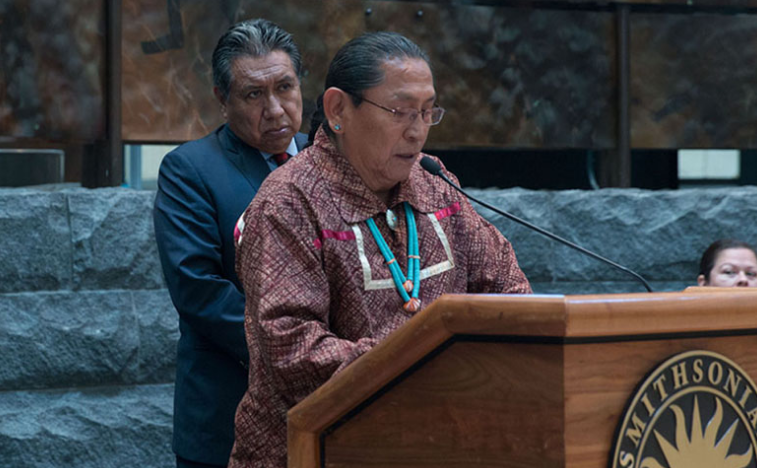
- Details
- By Native News Online Staff
President Joe Biden on Wednesday signed the Safeguard Tribal Objects of Patrimony (STOP) Act into federal law. The law will prevent the illegal exportation of tribal cultural heritage items whose trafficking is already prohibited domestically.
The Pueblos in New Mexico have sought this protection for several years. The All Pueblo Council of Governors (APCG) Resolution No. 2021-08 reaffirmed the Pueblos’ efforts to stop the theft and illegal sale of Pueblo cultural items domestically and abroad, detailing the painful history of these human rights violations.
The work on the STOP Act, led by the Pueblo of Acoma, is part of a larger effort by the Pueblos to protect languages, cultures, and traditions and the preservation of sacred landscapes, including the Greater Chaco Region and the Caja del Rio. We celebrate the recent reintroduction of the Chaco Cultural Heritage Area Protection Act as part of these efforts.
Until the STOP Act was signed into law, there was no law specifically stop the export of Native American patrimony. The STOP Act will explicitly prohibit the export of tribal cultural items obtained illegally and better enable their return if found overseas. This bill had bipartisan support.
“The Pueblo of Acoma has firsthand, lived experiences of illegal removal and trafficking of our sacred tribal cultural heritage items. We need these items for our very cultural survival, and their loss hurts us individually and as a people. One example is the Acoma Shield, which was stolen from its Acoma caretaker, taken out of the country, and put on an auction block in Paris, France,” former Governor Kurt Riley, Pueblo of Acoma said in a statement.
“During our initial attempts to repatriate the Acoma Shield, the Pueblo realized after seeking help from multiple federal agencies that federal law and international agreements with France and other countries could not help. These past seven years, in working with the support of the New Mexico Congressional Delegation, the Pueblo has achieved the passage of a law that for the first time facilitates the international repatriation of items of tribal cultural patrimony,” Riley continued.
Current Governor Randall Vicente, Pueblo of Acoma issued this comment in a statement: “The Acoma people celebrate the culmination of our years-long fight for enactment of the STOP Act. We are very proud of Senator Heinrich and Congresswoman Leger Fernandez for their role as lead sponsors and of Senator Lujan and Congresswoman Stansbury for their strong co-sponsorship. Tribal lifeways are threatened by the removal of our sacred items from our communities, and their loss is painful to our very beings. We believe the STOP Act will help keep sacred items at home where they belong, and that it will bring home those items that have already left.”
More Stories Like This
50 Years of Self-Determination: How a Landmark Act Empowered Tribal Sovereignty and Transformed Federal-Tribal RelationsThe Shinnecock Nation Fights State of New York Over Signs and Sovereignty
Navajo Nation Council Members Attend 2025 Diné Action Plan Winter Gathering
Ute Tribe Files Federal Lawsuit Challenging Colorado Parks legislation
NCAI Resolution Condemns “Alligator Alcatraz”
Help us defend tribal sovereignty.
At Native News Online, our mission is rooted in telling the stories that strengthen sovereignty and uplift Indigenous voices — not just at year’s end, but every single day.
Because of your generosity last year, we were able to keep our reporters on the ground in tribal communities, at national gatherings and in the halls of Congress — covering the issues that matter most to Indian Country: sovereignty, culture, education, health and economic opportunity.
That support sustained us through a tough year in 2025. Now, as we look to the year ahead, we need your help right now to ensure warrior journalism remains strong — reporting that defends tribal sovereignty, amplifies Native truth, and holds power accountable.
 The stakes couldn't be higher. Your support keeps Native voices heard, Native stories told and Native sovereignty defended.
The stakes couldn't be higher. Your support keeps Native voices heard, Native stories told and Native sovereignty defended.
Stand with Warrior Journalism today.
Levi Rickert (Potawatomi), Editor & Publisher

